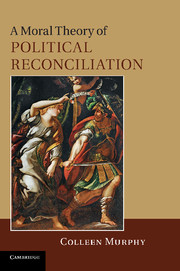5 - Truth commissions
Published online by Cambridge University Press: 02 December 2010
Summary
INTRODUCTION
This chapter focuses on the role of truth commissions in promoting political reconciliation. Truth commissions are official, temporary bodies charged with investigating and reporting on human rights abuses in a society's past. While the TRC (mentioned in Chapter 1) established in South Africa following apartheid is the most well known, in fact there have been dozens of truth commissions established around the world in the past three decades. Others include those in Argentina, Sri Lanka, Ghana, Haiti, Guatemala, Chile, the Philippines, Uganda, El Salvador, Peru, and Sierra Leone.
My interest in this chapter is in the contributions of truth commissions to political reconciliation, and is thus narrower in scope than discussions in the literature. The thesis I defend is that truth commissions can contribute to political reconciliation by fostering respect for moral agency. In defending this thesis, I set aside questions about whether truth commissions sacrifice justice and how the values of reconciliation can be balanced against other moral considerations and values. This is not to suggest that such additional or larger questions are unimportant. Rather, my hope is to clarify the contributions truth commissions make, morally speaking, as a first step in understanding and assessing their overall justifiability in the context of transitions and transitional justice.
There are four sections in this chapter. As I discussed in Chapter 4, a general moral failing illustrated by the breakdown of the rule of law, absence and unreasonableness of political trust, and diminishment of central capabilities is a failure to respect the moral agency of certain individuals or groups of individuals within society.
- Type
- Chapter
- Information
- A Moral Theory of Political Reconciliation , pp. 144 - 166Publisher: Cambridge University PressPrint publication year: 2010



